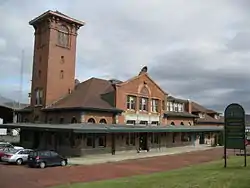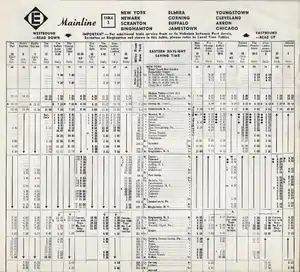Railroad Terminal Historic District
Railroad Terminal Historic District is a national historic district in Binghamton in Broome County, New York. The district includes 19 contributing buildings. Four of the buildings were directly related to Binghamton's rail passenger and freight operations, including the passenger station. Five buildings were built as warehouses, and ten were built to house retail activities with residential or office uses on the upper floors. The buildings were built between 1876 and 1910, with a major addition to one of them completed in 1932. This Delaware, Lackawanna and Western Railroad passenger station, with its Italian Renaissance campanile, was built in 1901.[2] For most years of passenger service to Binghamton Delaware and Hudson Railway and Erie Railroad trains used the station 150 yards away.[3]
Railroad Terminal Historic District | |
 Railroad Terminal Historic District, Binghamton NY, October 2009 | |
  | |
| Location | Intersection of Chenango St. and Erie-Lackawanna RR tracks, Binghamton, New York |
|---|---|
| Coordinates | 42°6′15″N 75°54′29″W |
| Area | 18 acres (7.3 ha) |
| Built | 1901 |
| Architectural style | Late 19th And 20th Century Revivals, Renaissance, Romanesque |
| NRHP reference No. | 86000488[1] |
| Added to NRHP | March 20, 1986 |
It was listed on the National Register of Historic Places in 1986.[1]
Destinations when the station was in use

From this location there were Lackawanna trains such as the Phoebe Snow and the overnight Owl to Buffalo, New York to the west and Hoboken to the east. The Interstate Express served Syracuse to the north and Allentown and Philadelphia to the south. Other Lackawanna trains also served Syracuse and Utica, New York to the north and Scranton, the Poconos and northern New Jersey to the south. [4]
Erie Railroad trains joined the DL&W trains at the station in 1958.[5] such as the Lake Cities, the Erie Limited and the Atlantic Express/Pacific Express served Chicago to the west and Hoboken to the east. (Erie trains that year also stopped using the company's Pavonia Terminal in Jersey City.)[6] The last long distance train was on January 6, 1970 when the Lake Cities stopped running.[7]
References
- "National Register Information System". National Register of Historic Places. National Park Service. March 13, 2009.
- Mark L. Peckham (January 1986). "National Register of Historic Places Registration: Railroad Terminal Historic District". New York State Office of Parks, Recreation and Historic Preservation. Archived from the original on 2013-11-13. Retrieved 2009-11-10. See also: "Accompanying 19 photos".
- "Index of Stations, 1276". Official Guide of the Railways. National Railway Publication Company. 82 (8). January 1950.
- Delaware, Lackawanmna and Western Railroad timetable, April 25, 1954, Tables 1, 2, 4
- "Index of Stations, 1194". Official Guide of the Railways. National Railway Publication Company. 91 (3). August 1958.
- "Erie Railroad, Tables 1, 2, 3, 8, 9". Official Guide of the Railways. National Railway Publication Company. 82 (8). August 1958.
- Sanders, Craig (2003). 'Limiteds, Locals, and Expresses in Indiana, 1838–1971.' Bloomington, Indiana: Indiana University Press. ISBN 978-0-253-34216-4, 145-49
External links
- Historic American Buildings Survey (HABS) No. NY-5567, "Delaware, Lackawana, & Western Railroad Station, Lewis & Chenango Streets, Binghamton, Broome, NY", 7 photos, 1 data page, 1 photo caption page
- Historic American Engineering Record (HAER) No. NY-30, "Erie Railway, Binghamton Station, Lewis & Chenango Streets, Binghamton, Broome, NY", 3 photos, 1 data page, 1 photo caption page
- HAER No. NY-31, "Erie Railway, Binghamton Freight Station, Lewis & Chenango Streets, Binghamton, Broome, NY", 3 photos, 1 data page, 1 photo caption page
| Preceding station | Delaware, Lackawanna and Western Railroad | Following station | ||
|---|---|---|---|---|
| Painted Post toward Buffalo |
Main Line | Scranton toward Hoboken | ||
| Johnson City toward Buffalo |
Conklin Centre toward Hoboken | |||
| Chenango Bridge toward Utica |
Utica Branch | Terminus | ||
| Chenango Bridge toward Oswego |
Oswego Branch | |||

